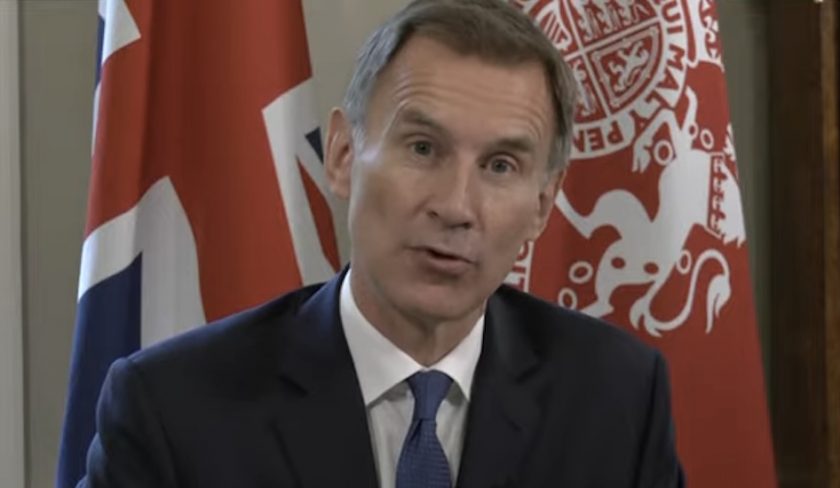Chancellor Jeremy Hunt scraps ‘almost all’ tax measures in Liz Truss’s mini-budget

The Chancellor of The Exchequer Jeremy Hunt has brought forward a number of measures from 31 October’s Medium-Term Fiscal Plan, in effect conducting a near full u-turn on the Prime Minister’s agenda.
Last month Prime Minister Liz Truss has announced that the energy price cap will be frozen at £2,500 for the next two years. In an emergency statement today, Chancellor Jeremy Hunt announced that help with energy bills for all households will only last until April, then a ‘Treasury-led review of energy support after April 2023’ will be used.
He also said that “almost all” of the tax cuts set out in the mini-Budget are being reversed, “…we will reverse almost all the tax measures announced in the growth plan three weeks ago that have not started parliamentary legislation”
He also announced that the basic rate of income tax to remain at 20% until economic conditions allow for it to be cut, IR35 and dividend tax rate reforms no longer going ahead.
Mr Hunt said, “The government has today decided to make further changes to the mini budget and to reduce unhelpful speculation about what they are. We’ve decided to announce these ahead of the medium term fiscal plan which happens in two weeks. I’ll give a detailed statement to Parliament this afternoon and answer questions from MPs. But because these decisions are market sensitive, I’ve agreed with the speaker the need to give an early brief summary of the changes which are all designed to provide confidence and stability”
Much comment has been made over the nature of the statement, and personal decision making by him rather than the Prime Minister – for example when announcing tax rates, ” I’ve decided that the basic rate of income tax will remain at 20% and it will do so indefinitely until economic circumstances allow for it to be cut”
In his statement the Chancellor announced a reversal of almost all of the tax measures set out in the Growth Plan that have not been legislated for in parliament. The following tax policies will no longer be taken forward:
- Cutting the basic rate of income tax to 19% from April 2023. While the government aims to proceed with the cut in due course, this will only take place when economic conditions allow for it and a change is affordable. The basic rate of income tax will therefore remain at 20% indefinitely. This is worth around £6 billion a year.
- Cutting dividends tax by 1.25 percentage points from April 2023. The 1.25 percentage points increase, which took effect in April 2022, will now remain in place. This is valued at around £1 billion a year.
- Repealing the 2017 and 2021 reforms to the off-payroll working rules (also known as IR35) from April 2023. The reforms will now remain in place. This will cut the cost of the government’s Growth Plan by around £2 billion a year.
- Introducing a new VAT-free shopping scheme for non-UK visitors to Great Britain. Not proceeding with this scheme is worth around £2 billion a year.
- Freezing alcohol duty rates from 1 February 2023 for a year. Not proceeding with the freeze is worth approximately £600 million a year. The next steps of the Alcohol Duty Review announced in Growth Plan 2022 will continue as planned. The alcohol duty uprating decision and interactions with the wider reforms to alcohol duties under the Alcohol Duty Review will be considered in due course.
This follows on from the previously announced decisions not to proceed with the Growth Plan proposals to remove the additional rate of income tax and to cancel the planned increase in the corporation tax rate.
Taken together, these changes are estimated to be worth around £32 billion a year.
The government’s reversal of the National Insurance increase and the Health and Social Care Levy, and the cuts to Stamp Duty Land Tax, “will remain benefitting millions of people and businesses. The £1 million Annual Investment Allowance, the Seed Enterprise Investment Scheme and the Company Share Options Plan will also continue to further support business investment”
UK Gov say, “However, looking beyond April, the Prime Minister and the Chancellor have agreed that it would be irresponsible for the government to continue exposing the public finances to unlimited volatility in international gas prices. A Treasury-led review will therefore be launched to consider how to support households and businesses with energy bills after April 2023. The objective of the review is to design a new approach that will cost the taxpayer significantly less than planned whilst ensuring enough support for those in need. The Chancellor also said in his statement that any support for businesses will be targeted to those most affected, and that the new approach will better incentivise energy efficiency.”
“The government is prepared to act decisively and at scale to regain the country’s confidence and trust. The Chancellor stated in his speech that there will be more difficult decisions to take on both tax and spending. This means doing what is needed to lower debt in the medium term and to ensure that taxpayers’ money is well spent, putting public finances on a sustainable footing.”
“In light of this, government departments will be asked to find efficiencies within their budgets. The Chancellor is expected to announce further changes to fiscal policy on 31 October to put the public finances on a sustainable footing.”
Spotted something? Got a story? Email: [email protected]
Latest News
